Manish Gaekwad's Blog, page 6
May 4, 2020
The Making of Mrs. Serial Killer
Farah Khan was the inspiration along with ham, masks, and a hazmat suit

‘Karna kya hai mujhe, director sahiba?’ Akshaye Khanna tightened his brow to a high-strung Farah Khan.
‘Oye, sahiba-wahiba hogi Madhuri, I’m your dictator,’ Farah yelled back at him.
‘Dick-tator!’ he punned.
‘Chal bhai, I have more balls than all of you kya!’ she said.
Aaj tak Akki ne nahi poocha kya karna hai!
Kats ki meow tak nahi nikli mere saamne!
Bada aaya acting karne, jaa haath-paer dheele kar, tere ko frame mein adjust karti hoon.’
Khanna walked away.
Farah announced into a loudspeaker to her crowd actors.
‘I want more ham, ham, not lambs, don’t be meek, jo jitna ham karega usko utna footage milega.’
An over-enthusiastic assistant released a truckload of a hundred suckling pigs into the crowd. People went berserk running helter-skelter.
‘Perfect,’ Farah exalted, instructing her DOP (director of photography) to take only close-up shots.
Amateur actors looked trapped, perplexed as they ran in circles. It was just the expression she wanted to capture.
The pigs were a brilliant idea.

She decided to make the pigs an integral part of the film. Camping in a village, she had them taken care of.
When the actors were ready to film, she’d command over a loudspeaker, ‘Lights, Camera, Ham.’
A dutiful spot boy would release the piglets on the sets and actors would deliver their lines in one take, trying to stay aground in the mad rush.
Actors had to live with pigs during the entire shooting of the film.
Farah wanted the actors to closely study the little trotters to understand their own hyperactive characters.
‘Shabana aunty carried a pig on her poorly-clothed shoulders across a stream in Paar,’ she often reminded her unsure actors of their passion towards their craft.
Having been forced to share their beds with these squealing, squelching, stinky oinkers, their speech pattern had also changed. Actors would often greet fellow actors on the sets with an oink instead of a hello.
The night the film shooting wrapped up, while actors slept in their tent beds, Farah sat by a bonfire roasting the pigs, silver-foiling their legs and scribbling with a sharpie, ‘Ham Award’.
She would present it to her wonderful actors the next morning as a parting gift.
Unit members in the bus were told they were in for a treat at breakfast. When they opened their gift packages, they were infuriated by her sinister act. They decided to avenge their roasted brothers and sisters.
Their blood curdled with vegetarianism.
At the film premiere, actors Akshay Kumar, Katrina Kaif, Akshaye Khanna stepped out in a pig mask from their limos.
Farah, who was standing on a dais to welcome them, was aghast, but not one to be upstaged by their protest, she ordered to an assistant, ‘Get me a Ham, ham,’ she began to huff and stammered, ‘Hammer, hammer!’
A man in a costume, dressed as a golden hammer, appeared before the crowd.
The actors, stunned, gave up. Nothing could rattle her. She was armed with her deadliest weapon yet, and seemed every bit bloodthirsty.
The man in the hammer suit catatonically whispered into her ear, ‘I’m ready to nail it.’
Farah was mighty pleased with her dummy husband Shirish Kunder.
A thunderous applause arose for Mrs. Serial Killer.
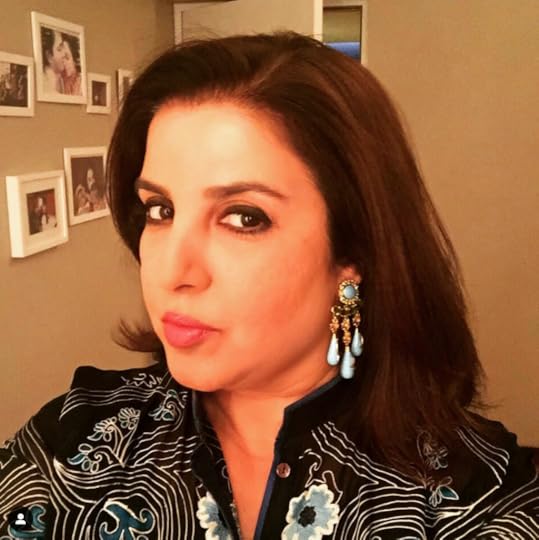
Disclaimer: This, not she, is a work of overactive imagination.

April 30, 2020
Tribute: Rishi Kapoor
Everyone’s favourite star child
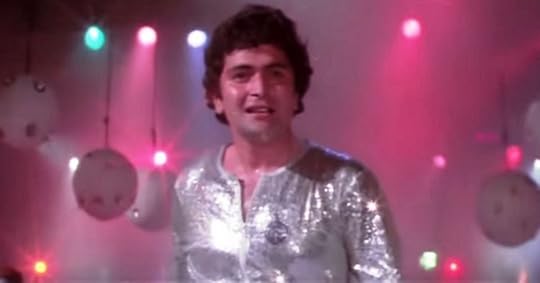
I have a Rishi Kapoor story that connects him to my mother who also met him.
In the 80s, my mother was an extra on the sets of the song Om Shanti Om in the film Karz. She saw him dancing on a revolving stage and jived along.
His name in the film was Monty. She decided to pet name me Monty. It was misspelled as Montu on my birthday cake. Bakers tend to play truant. Check picture.
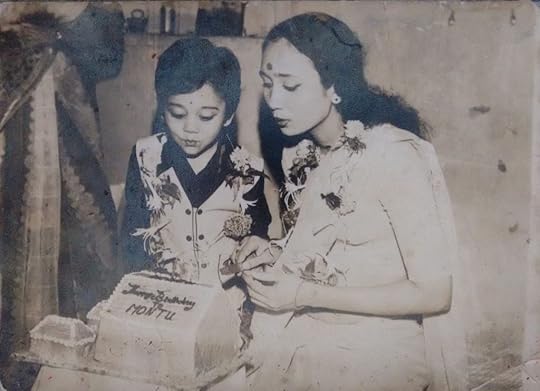
One day, while watching the video of that song on a compact black and white television set in my grandmother’s tin shed, my mother told me she was featured in the song.
I assumed she was one of the dancing girls in the video revolving around Rishi Kapoor. I jumped to where the television was and rotated my head like an owl trying to guess which one of the chorus girls was my mother.
“Woh gayi meri mummy,” I said and clapped each time a dancer spun forward in the track. I was being an over-excited child at that time.
Many years later, during a screening of the film 102 Not Out, Rishi Kapoor walked into the room. It was time to be over-excited and clap again like a child.
But he was the child. Not me.
He was a grumpy child in the film and an ebullient one outside.
An easy way to follow Rishi Kapoor in a crowded room is by listening. His voice identifies him before he can.
He has the animated energy of a child.
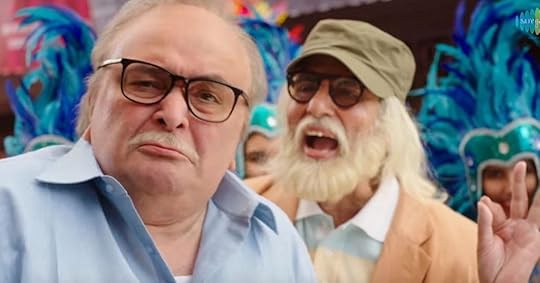 Rishi Kapoor in 102 Not Out.
Rishi Kapoor in 102 Not Out.I could have walked up to him and said my mother named me after your character Monty. That would have made me sound childish, trying to steal the attention away from him.
I stayed behind and watched him through his words ringing loud and clear in the air.
He was the star child in the room asking, where is my favourite toy?
His favourite toy being life itself, his vitality to have fun and play with it.
Last night, while going to bed, I read the news of his hospitalisation and had a doubt that he will not make it through today. I woke up to a song playing outside my window.
Tu tu tu tu tu tara. Todo na dil hamara.
Only he could make it cute and believable the way he sang it like a man-child in the film.
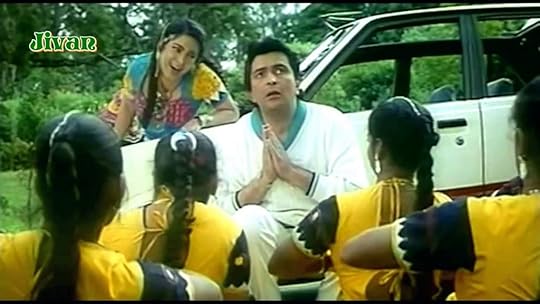 Rishi Kapoor performing in Tu Tu Tu Tu Tu Tara.
Rishi Kapoor performing in Tu Tu Tu Tu Tu Tara.
April 29, 2020
Tribute: Irrfan Khan
A taste for immortality
 Photo: Rohan Shrestha
Photo: Rohan ShresthaThe one time I saw him up close was after midnight.
I was walking back home from Starbucks, after having read a book in a corner with a cup of hot chocolate: two of my favourite weekend activities in the late-night hour when the cafe hums with the scent of caffeine and peace.
I spotted him walking out of a hotel, clutching a bottle of beer between his knees. He walked funny, trying to balance the half-consumed bottle. He saw me look at him. There was no one else on the deserted road.
Could you please help me with this?
He asked, gesturing with his toady eyes at the bottle being strangled by his legs.
Our instinct is to refuse something out of politeness with a quick reflex no. Such polite refusal can also be read as insensitive and rude.
I put my hand between his knees. That is just one way of looking at this bottleneck situation.
So close.
I held his bottle while he ferreted for his car keys with his hands sliding into his jacket pockets, trouser pockets, busy hands they were, could not even hold his drink for him.
I took a sip from his bottle.
It was an act of effrontery.
How could I make it jootha!
In our culture it is said that if you consume a great person’s jootha, some of their greatness rubs on to you.
Lovers eat each other’s jootha to profess undying affection.
Some high-minded casteist will kill you if you touch their jootha, let alone eat it.
There is no English equivalent to explain what jootha means. The closest would be is eating from another’s plate but that still feels less threatening than biting food from someone’s mouth.
So I drank from his bottle not knowing if he is above caste, superstition, or just hygiene. He did change the spelling of his name twice to fatten an astrologer’s wallet though.
He saw me drink from his bottle and chuckled. He read my eyes. They were fan-whirling eyes.
He yanked the bottle from my hand and took a sip from it.
His droopy bloodshot eyes always reflected a sad death approaching but his balmy smile waved back with life resisting it.
I smiled back.
We were both drinking the elixir of immortality from the same vessel, or flat beer in this bottleneck case.
In that one moment, we were the same person, with no one greater or smaller, as equals, depending how you read this story.
He fixed the bottle back between his knees.
He opened the door to the driver’s seat of a jeep and tried to slink in without removing the bottle from his locked knees.
I walked past him, turning to see if he was as convincing an actor in real life. He got in. He turned to look if I was watching.
His smile didn’t leave his lips at goodbye.
He sped away.
He was struggling perhaps, but he was winning nevertheless.
His smile has never left me.


April 27, 2020
Poem
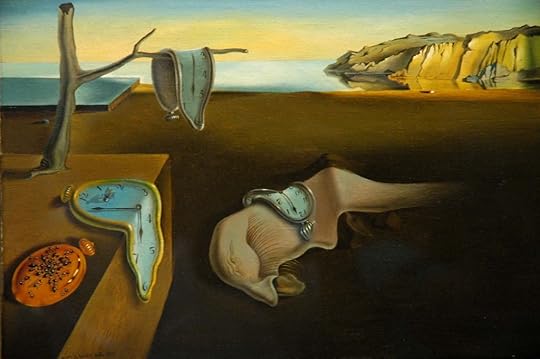
noon, a fossil in amber light
dreams in eternal sleep
the hours pass like sand
through the fist of time
the universe, an octopus
releases the ink of night
waltzing to memory’s lyric
what we think and imagine
is closer to being profound
as weary, old, forgotten habit
Painting: Salvador Dali, The Persistence of Memory

April 13, 2020
10 books for a decade
These 10 books more or less define a decade (2010–2020) of reading for me

Most of them were also published in this decade. Seven are written by women. I only realise this now. Means men are as usual slacking here also.
April 7, 2020
POEM
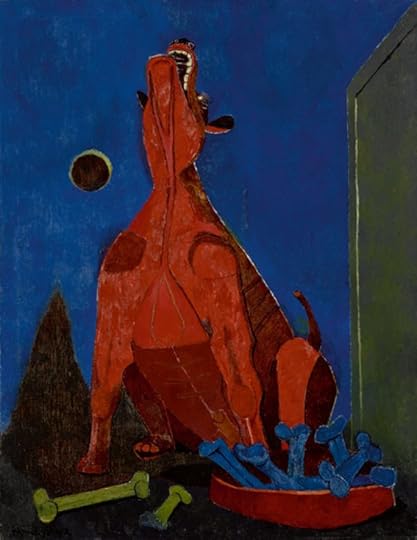 Dog Howling at the Moon by Rufino Tamayo
Dog Howling at the Moon by Rufino Tamayoचाँद की आधी कच्ची आधी पकी
गेहूं की रोटी
आसमान के काले तवे पर
हांफते हांफते
गुलाबी फुल्का बन कर पक गयी
सोचा एक कौर मैं खा लूं
और एक निवाला गली के कुत्ते को दे दूं
जो भूख के मारे भौंक कर चाँद को
नरगिसी कोफ्ता समझ बैठा है
है ही दिन कुछ ऐसे सुर्ख़ियों में
रात को चाँद की रोटी के पकने का
बे-सब्री से इंतज़ार किया जाता है

March 14, 2020
Poem
Ek taraf sheher jalta raha…
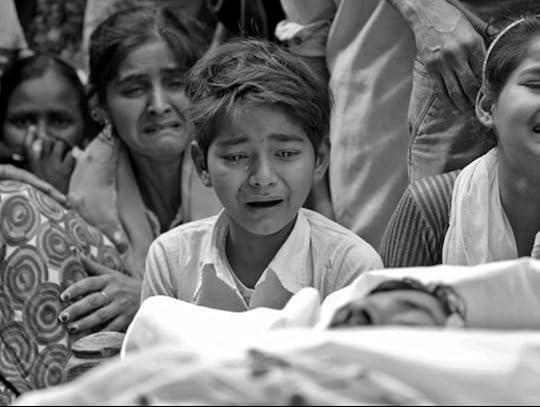
एक तरफ शहर जलता रहा
एक तरफ होली मनती रही
जब गुलाल हवा में घुलने लगा
तब ज़मीन पर खून के छींटे भी पढ़ने लगे
एक तुम्हारे घर में त्यौहार के ढोल बजे
एक हमारे कूचे में मातम की चीख उठी
जिस शहर में कभी हम रफ़ाक़त से मिले थे
वहीँ आज हमे गैर मुल्की में गिनवाया गया
छोड़ के जा रहे हैं मुबारक हो शहर तुम्हे
दिल से भी तुम्हारे हिजरत लें यही तुम दुआ करना
***
Ek taraf sheher jalta raha
Ek taraf holi manti rahi
Jab gulaal hawa mein ghulne laga
Tab zameen par khoon ke cheete bhi padhne lage
Ek tumhare ghar mein tyohaar ke dhol baje
Ek hamare ghar mein maatam ki cheekh uthi
Jis sheher main kabhi hum rafaaqat se mile thay
Wahin aaj humey gair mulki mein ginwaya gaya
Chhod ke jaa rahein hain, mubarak ho sheher tumhe
Dil se bhi tumhare hijrat lein yehi tum dua karna
***
Rafaaqat: Friendship, Gair Mulki: Foreigner, Hijrat: Migrate

December 27, 2019
Poem: An Earful of Less
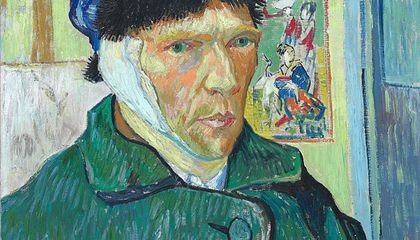 Painting: Self-Portrait with Bandaged Ear, Vincent van Gogh, 1889
Painting: Self-Portrait with Bandaged Ear, Vincent van Gogh, 1889the barber snipped my ear and continued cutting my hair
as if my head wouldn’t notice what went missing with the locks
unperturbed, the barber smiled at me in the mirror
hoping the blood would not spill
on the black cape he had loosely tied around my unheroic neck
he had his chance there i must say
had he knotted the strings too tight
there would be no murmur of death, only death.
but when i touched my ear and felt a yellow rage
i thought of that artist who had cut his own
to paint the night in what dizzying blues
from the agony of his own reds spilling
sorry, the barber said, it is my first day
i consoled myself it will regrow along with
some of the artist’s unmitigated pain to let go
***

December 13, 2019
Actress Neena and I
Neena Gupta interviews me about my background.
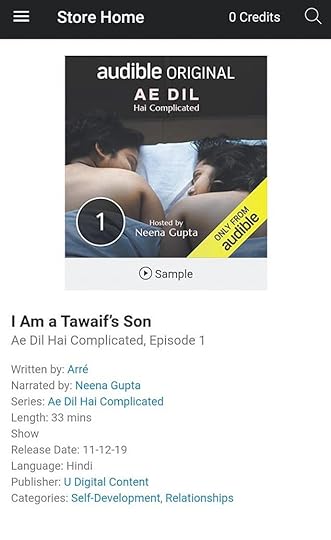 Amazon Audible app
Amazon Audible appActress Neena Gupta interviewed me. But why, hai na? Who the F am I? I hear you. That question rattles me everyday.
November 21, 2019
Badnam Basti — India’s first film about gay love
Lost since 1971, found in 2019.

India’s first film about queer love — Badnam Basti, made in 1971, and lost since, has been found in an archive in Berlin.
What a story to remake/revisit perhaps, and give it its due in the canon.
In 2016, when I wrote this story for Scroll.in, “The untold story of ‘Badnam Basti’, possibly India’s first gay movie,” there was no hope of ever finding it.
I had read both the Hindi novel एक सड़क सत्तावन गलियां by Kamleshwar and its English translation A Street With 57 Lanes as part of the research and found the narrative of homosexual love bristling with unspoken emotions.
Badnam Basti could have set the precedent for queer love but got lost in transgression. It could have been a Brokeback Mountain because it did have an unnameable love story at the core of it.
Annie Proulx’s short story about two cowboys in Texas is set in 1963, but was written in 1997. Kamleshwar’s novel was written in 1957, way ahead of the Hollywood blockbuster that broke the dam.
Badnam Basti was also four years before a scene in Sholay (1975) in which Jai and Veeru are put in a prison cell with a colourful jailbird who struts around with lascivious intent. This standard played out for years and harmed more than helped.
Unfortunately, upon release, no one went to see Badnam Basti. Now the task of watching it, and bringing it to India is something worth trying for.




